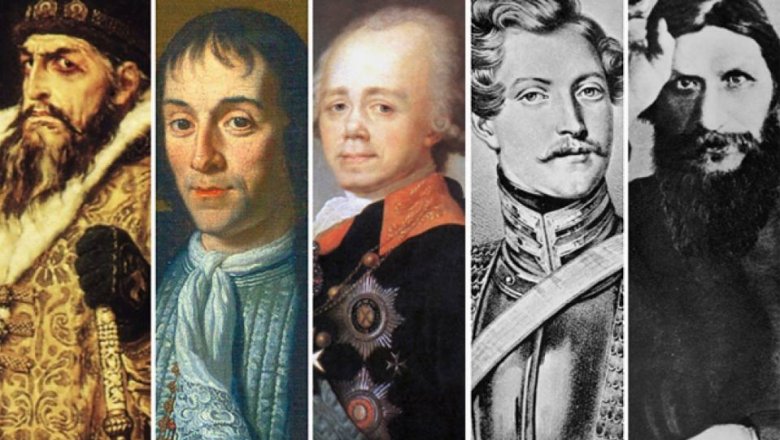Five crimes of Russian history from the point of view of the criminal code
Aephi decided to look at five well-known events of Russian history from the point of view of the current Criminal code of the Russian Federation.

During discussions on historical topics of our contemporaries often come to the events, at the distance of several centuries, with the current ideas about the law, humanism, morality and ethics. Meanwhile these settings in different countries and at different times, sometimes differ dramatically.
Nonetheless, it is interesting to know what would be one or another historical character for his deeds according to modern laws.
Aephi decided to look at five well-known events of Russian history from the point of view of the current Criminal code of the Russian Federation. In advance I must warn you that this is nothing more than a historical experiment, not claiming the status of indisputable truth.
Case number 1. Ivan the terrible kills his son

In order to cool the most ardent defenders of the light image of the monarch, let us note that we consider only one of the most famous versions of the events, without insisting that it is the truth.
So, the testimony of the witness Antonio Possevino, papal legate in Eastern Europe, about the events that took place in the Alexandrovskaya Sloboda in November, 1581:
“The third wife of the son of Ivan as I was lying on the bench, dressed in a bodycon dress, as she was pregnant and didn’t think she’d get in. Suddenly she is visited by the Grand Prince of Moscow. She immediately rose to meet him, but it was impossible to calm. The Prince struck her in the face, and then she beat his staff, former under him that the next night she threw the boy.
Read also In Russia was established the first monument to Ivan the terrible
In Russia was established the first monument to Ivan the terrible
At this time, the father rushed in the son of Ivan and begged not to beat his wife, but that only drew the wrath and the blows of the father. He was very seriously wounded in the head, almost at the temple, these same staff. Before that, in anger at the father and son warmly reproached him in the following words:
“You’re my first wife for no reason was imprisoned in the monastery, did the same with his second wife and now beat the third to destroy the son she is carrying in the womb”.
Wounding of the son, the father immediately surrendered to the deep sorrow, and immediately called from Moscow healers and Andrew Sakalova with Nikita Romanovich to have on hand. On the fifth day the son died and was transferred to Moscow, with universal grief.
In the actions of Ivan the terrible against his daughter Elena Sheremet’evoy, there are signs of the crime provided by part one of article 111 of the criminal code of Russian Federation “Deliberate causing of heavy harm to health”.
Intentional infliction of grievous bodily harm, dangerous to human life or resulting in loss of vision, speech, hearing or any organ or the loss of authority of its functions, the interruption of pregnancy, mental disorder, illness, drug addiction or substance abuse, or expressed in indelible disfigurement of the face, or causing significant permanent loss of General work capacity not less than on one third or obviously for guilty complete loss of ability to work shall be punishable by deprivation of liberty for a term up to 8 years.
The same article 111 of the criminal code can be applied to the king, and in connection with his actions against his son Ivan Ivanovich. However, here comes into effect part four, which States: “Acts which have entailed death of the victim, shall be punishable by deprivation of liberty for a term up to 15 years with restriction of liberty for a term up to two years or without it”.
To avoid a long imprisonment, Ivan the terrible would be the case if the lawyers proved that he acted in heat of passion or was suffering from a mental illness.
In the latter case, the king likely would wait for the sending to compulsory treatment.
Case number 2. Embezzlement of Prince Menshikov

In 1727, his serene Highness Prince Alexander Danilovich Menshikov, losing influence on the young Emperor Peter II had lost power and was under investigation. Investigative Commission of the Supreme Privy Council has revealed numerous financial abuses Menshikov, who officially took the post of St. Petersburg Governor-General.
Accused of embezzlement Menshikov without trial was deprived of property, honours, and exiled to Berezov, where he died.
If the matter of his serene Highness Prince Menshikov was seen today, he could be charged with part 3 of article 285 of the criminal code “Abuse of official powers committed by a person holding a public office of the Russian Federation or a government post of the Russian Federation, entailed heavy consequences”.
The sanction for this crime is deprivation of liberty for a term up to 10 years with deprivation of the right to occupy certain positions or engage in certain activities for a term up to 3 years.
Also, Menshikov could be imputed to part 6 of article 290 of the criminal code “bribe-taking by a person holding a state post of the Russian Federation, with extortion of a bribe in especially large size”.
Such crimes are punishable by a fine in the amount from 3 to 5 million rubles or the salary or other income of the convicted person for a period of three to five years, or in the amount of vosmidesyatniki to the hundredfold sum of a bribe with deprivation of the right to occupy certain positions or engage in certain activities for a term up to 15 years or imprisonment for the term from 8 till 15 years with a fine in the amount up to semidesyatiletnego the amount of the bribe or without such and with deprivation of the right to occupy certain positions or engage in certain activities for up to 15 years or without such deprivation.
Case number 3. The overthrow and murder of Emperor Paul I

Paul I was killed by officers in the Mikhailovsky castle in his bedchamber in the night of 12 (24 new style), March 1801. The conspiracy involved the de Ribas, Vice-Chancellor N. P. Panin, the commander of Izyum easily horse regiment L. L. Bennigsen, count Nikolai Zubov, the commanders of the guard regiments: Semenovsky — N. I. Depreradovich, Cavalry — F. P. Uvarov, The Transfiguration — P. A. Talyzin. The soul and the organizer of the conspiracy, P. A. Palen — Petersburg Governor-General and the head of the secret police.
The participants of the conspiracy and assassination to incriminate several articles of the criminal code: article 278 “Violent capture of power or forcible retention of power” (deprivation of liberty for a term of 12 to 20 years with restriction of liberty for a term up to two years), article 279 “Armed rebellion” (deprivation of liberty for a term of 12 to 20 years with restriction of liberty for a term up to two years) and article 277 “the Encroachment on life state or the public figure”. This crime is punishable by life imprisonment or the death penalty.
Case number 4. The death of Pushkin in a duel with Dantes

January 27 (February 8, new style), 1837, near St. Petersburg, in the woods near the commandant’s garden held a duel where Alexander Pushkin was fatally wounded in the stomach by Georges Charles d’anthes. The conditions of the duel was fatal and leaves no chance to survive both enemies: under the terms they were at twenty paces from each other, the barrier was ten steps was allowed to shoot from any distance on the way to the barrier. D’anthes fired first. Pushkin fell after the shot, briefly lost consciousness, but recovered quickly. The poet suggested that the bullet had shattered the femur, but said he has enough forces to return fire. A bullet from a gun Pushkin came to the Dantes in the chest, hitting his hand.
Wound Dantes was easy and the wound Pushkin — a deadly two days later he died.
As you know, the modern Russian legislation does not recognize duels, so, Mr. Dantes would have to answer to the fullest extent. At first glance, Dantes can be imputed to the parts 2 and 4 of article 111 of the criminal code “Intentional infliction of grievous bodily harm, using weapons or objects used as weapons, entailed on imprudence death of the victim”. The punishment for this crime is deprivation of liberty for a term up to 15 years with restriction of liberty for a term up to two years or without it.
Can be imputed Dantes and article 105 of the criminal code “Murder”, for which he could face imprisonment for the term from 6 till 15 years with restriction of liberty for a term up to two years or without it.
But the defense has objections: it is not only Dantes shot Pushkin and Pushkin to Dantes.
Hence the lawyers can insist that we are talking about self-defense, so that Dantes can be fully justified. In the worst case we can talk about the article 108 of the criminal code “Murder committed while exceeding the limits of necessary defense”. The punishment in this case, correctional labor for up to 2 years or restriction of freedom for up to 2 years, or compulsory works for a term up to 2 years or imprisonment for the same term.
Case number 5. The Murder Of Grigory Rasputin

A close friend of the last Imperial couple, Rasputin was murdered on the night of 17 December 1916 (30 Dec, new style) in the Yusupov Palace on the Moika. Participated in the murder of F. F. Yusupov, V. M. Purishkevich, the Grand Duke Dmitri Pavlovich, Lieutenant S. M. Sukhotin and Dr. C. Lazovert.
Invited Felix Yusupov, Rasputin was initially fed poisoned cakes, but the poison had no effect. Then the victim was shot from a pistol, wounding. When Rasputin came to himself, he tried to escape, he was shot several times, and then struck the dying or already dead body multiple damage by punches, kicks and other improvised means. Then the body was taken to the car, dropping him off a bridge into a hole in the ice of the Neva.
In this case the sub-paragraphs “d” and “f” of part 2 of article 105 of the criminal code, i.e. murder committed with extreme stiffness group a group of persons upon a preliminary collusion.
According to the sanction of the article, the participants in such crimes can be punished with imprisonment for a term of 8 to 20 years with restriction of liberty for a term from 1 year to 2 years, or life imprisonment or the death penalty.